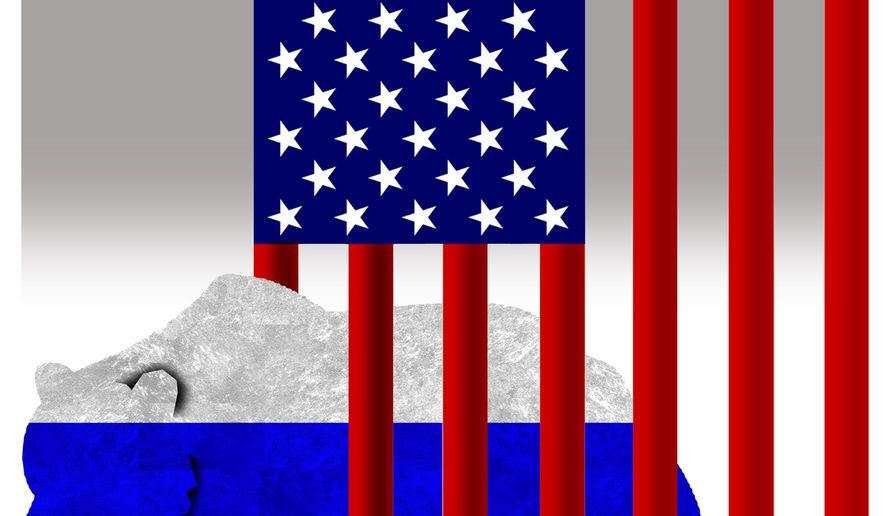OPINION:
Seventy years ago, George Kennan’s “Sources of Soviet Conduct” set the course for U.S. containment policy toward the Soviet Union. Following the Soviet Union’s collapse and a decade of economic turmoil which resulted in reduced Russian regional as well as global influence, President Vladimir Putin began implementing a national security strategy to resurrect Russia’s great power status. He wanted Russia to be perceived as equal in stature to the United States and to ensure western ideals of freedom, liberty, and democracy would not threaten his regime security.
Much of my career at CIA was spent focused on Russia and if there is one thing I learned, it was that Mr. Putin, who directs the lion’s share of Russia’s military and intelligence resources against the United States, continues like his Soviet predecessors to view the United States as Russia’s “Main Enemy.” Nothing illustrates better Russia’s zero sum, Machiavellian approach to its relations with the U.S. than its material support to its former enemy the Taliban, which has caused us to spill so much blood and treasure in Afghanistan.
Having spent his formative years in the KGB and having served as director of the FSB, Mr. Putin relied on espionage and influence operations reminiscent of KGB nefarious political warfare to combat his domestic and foreign enemies.
After discarding the albatross of Soviet Communist ideology, Mr. Putin’s Russia successfully pressed its hard and soft power in the former Soviet Union, South Asia, the Middle East and Latin America. Russia brazenly violated the territorial integrity of Georgia and Ukraine. Supporting Venezuela and Cuba as well as assisting Bolivia to establish a “peaceful” nuclear research facility, Russia renewed its influence in Latin America.
Russia regained status in the Middle East with aggressive military, diplomatic and intelligence operations in Syria and enhanced collaboration with Iran and Turkey, who purchased advanced Russian air defense systems. Seeking to entice a key U.S. ally into its camp, Mr. Putin hosted Saudi King Salman in early October. Russia has maintained an economic lifeline including a new internet capability for North Korea with an eye toward blocking regime change.
Now Mr. Putin has sought to export Russian’s pernicious ideas and influence to our homeland. He purposely targeted our social media and networking sites to influence the 2016 presidential election and degrade our trust in this modern cyber infrastructure, which has become so critical to our democratic process.
Mr. Kennan warned us about Russia’s “secretiveness, the lack of frankness, the duplicity, the wary suspiciousness, and the basic unfriendliness of purpose.” Mr. Kennan presciently wrote how “there will always be Americans who will leap forward with gleeful announcements that the ‘Russians have changed’ but we should not be misled by tactical maneuvers.” Mr. Kennan admonished us to counter Soviet efforts to control and warp the truth.
In 2012, Republican presidential candidate Mitt Romney drew the ire of incredulous Democrats and Republicans when he declared Russia was our top geopolitical adversary. Gov. Romney was accused of holding a “Cold War” mindset when he emphasized Russia was most often part of the problem rather than the country with which we could work to solve the global problems.
Stalin’s treatment of Poland in violation of the Yalta agreement shaped Mr. Kennan’s realistic view of Soviet post war aims and led him to argue for “intelligent long-range policies” based on a “firm and vigilant containment of Russian expansive tendencies.”
Will Russia’s latest cyber attacks on our democratic institutions be the tipping point, which finally removes the scales from our eyes? Can we design a 21st-century Russia strategy focused on strengthening our NATO alliance, supporting allies like Ukraine with increased intelligence sharing and weapons, containing Russian nefarious influence in the Middle East and beyond, and countering Russian influence and espionage operations?
Our national security would have been better served if we had heeded Mr. Romney’s warning. U.S. based social networking and media sites are still collecting information on Russia’s hacking operations leading up to and during the 2016 election. Cybersecurity incident response including forensics and countermeasures should take minutes not months.
Meanwhile, nine months and counting, the Senate Intelligence, House Intelligence, and Senate Judiciary Committees Russia probes are not even close to completion. We still have an opportunity to course correct our foreign policy toward Russia but with each Russian incursion, failing to do so only encourages more Russian aggression and increases threats to our national security.
• Daniel Hoffman is a former chief of station with the Central Intelligence Agency. His combined 30 years of government service included high-level overseas and domestic positions at CIA. He is currently vice president for global security at Sonoran Policy Group.




Please read our comment policy before commenting.